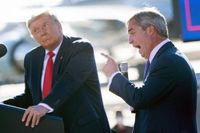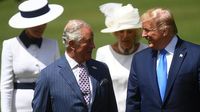In a surprising turn of events, President Donald Trump recently expressed enthusiasm for the idea of the United States joining the British Commonwealth following a report indicating that King Charles III may extend this proposal. The suggestion came to light on March 21, 2025, after Trump commented favorably on the matter while linking to an article discussing the secret offer from the king. "I love King Charles. Sounds good to me!" Trump stated, displaying his longstanding admiration for the royal family.
This idea sent ripples through political circles, particularly with Nigel Farage, the leader of Reform UK and a prominent advocate for Brexit, who joined in support. Farage highlighted the strategic advantages of such a membership: "A Commonwealth with the USA would complete the alliance of the English-speaking peoples and help prevent the spread of CCP influence. I helped to launch the Royal Commonwealth Society of America in 2017," he explained. This statement emphasizes Farage's ongoing commitment to strengthening ties between the U.S. and the Commonwealth.
The British Commonwealth, established in 1926, includes 56 member countries, many of which were once part of the British Empire. This historical thread connects the U.S. to the Commonwealth, as the U.S. fought for independence from British rule during the American Revolution from 1775 to 1783. Since then, however, the two nations have cultivated a robust alliance, particularly notable since the World Wars.
The potential for U.S. membership has been discussed previously during Trump's first term, but now, with King Charles reportedly ready to offer the U.S. the status of associate member during Trump's planned second state visit to the U.K., hopes for this development are rekindling. The Daily Mail reported that discussions on this topic are taking place at the highest levels within both nations, indicating its gravity in current geopolitics.
British Prime Minister Sir Keir Starmer recently emphasized the significance of the U.S.-U.K. relationship while presenting Trump with King Charles' invitation for a state visit. "There is no more important relationship for the United Kingdom, in defense, in security, in trade, in tech, in finance and so much more," Starmer remarked. This sentiment reflects a shared understanding among leaders that securing this membership could serve as a diplomatic bridge amid waning relations with the European Union.
King Charles III also echoed sentiments supporting the Commonwealth's relevance in today's world during a statement made on Commonwealth Day. On March 10, he said, "In these uncertain times, where it is all too easy to believe that our differences are problems instead of a source of strength and an opportunity for learning, the Commonwealth's remarkable collection of nations and peoples come together in the spirit of support and, crucially, friendship... The Commonwealth's ability to bring together people from all over the world has stood the test of time and remains as ever-important today."
The symbolic significance of U.S. membership cannot be overstated. Should this occur, it may alleviate some economic tensions— particularly the trade tariff disputes that have arisen between the U.S. and Canada— by reinforcing a unified front between these nations. Both Trump and Farage believe that such a move could help avoid the heightened tariffs that Trump has criticized in past statements.
Moreover, the trajectory of U.S.-U.K. relations throughout the past years, especially during Trump’s first state visit in 2019, suggests that a close friendship with the British royal family plays a significant role in his political narratives. Trump has often shared his regard for the late Queen Elizabeth II, remarking, "I got to know her very well... she was great." He has also expressed admiration for King Charles and has praised Prince William, though he has been less favorable towards Prince Harry and Meghan Markle.
As the discussions around this proposed membership continue to unfold, the implications of U.S. association with the Commonwealth are expected to attract attention beyond Britain and America. For many, this potential move symbolizes a reconciliation with historical ties and could open pathways for further collaboration on global challenges. The importance of maintaining a strong Commonwealth is not merely ceremonial; it represents a diverse international coalition that has played a pivotal role in global affairs.
Looking ahead, it seems clear that both nations are keen to harness their historical connection amid contemporary challenges. The intersection of American foreign policy and British strategy will likely continue to evolve, influenced by the shared goal of fortifying their positions against emerging global powers.
The future remains uncertain, but the idea of a close-knit Commonwealth that includes the U.S. could redefine international alliances in ways that resonate through diplomacy and cultural exchange.





